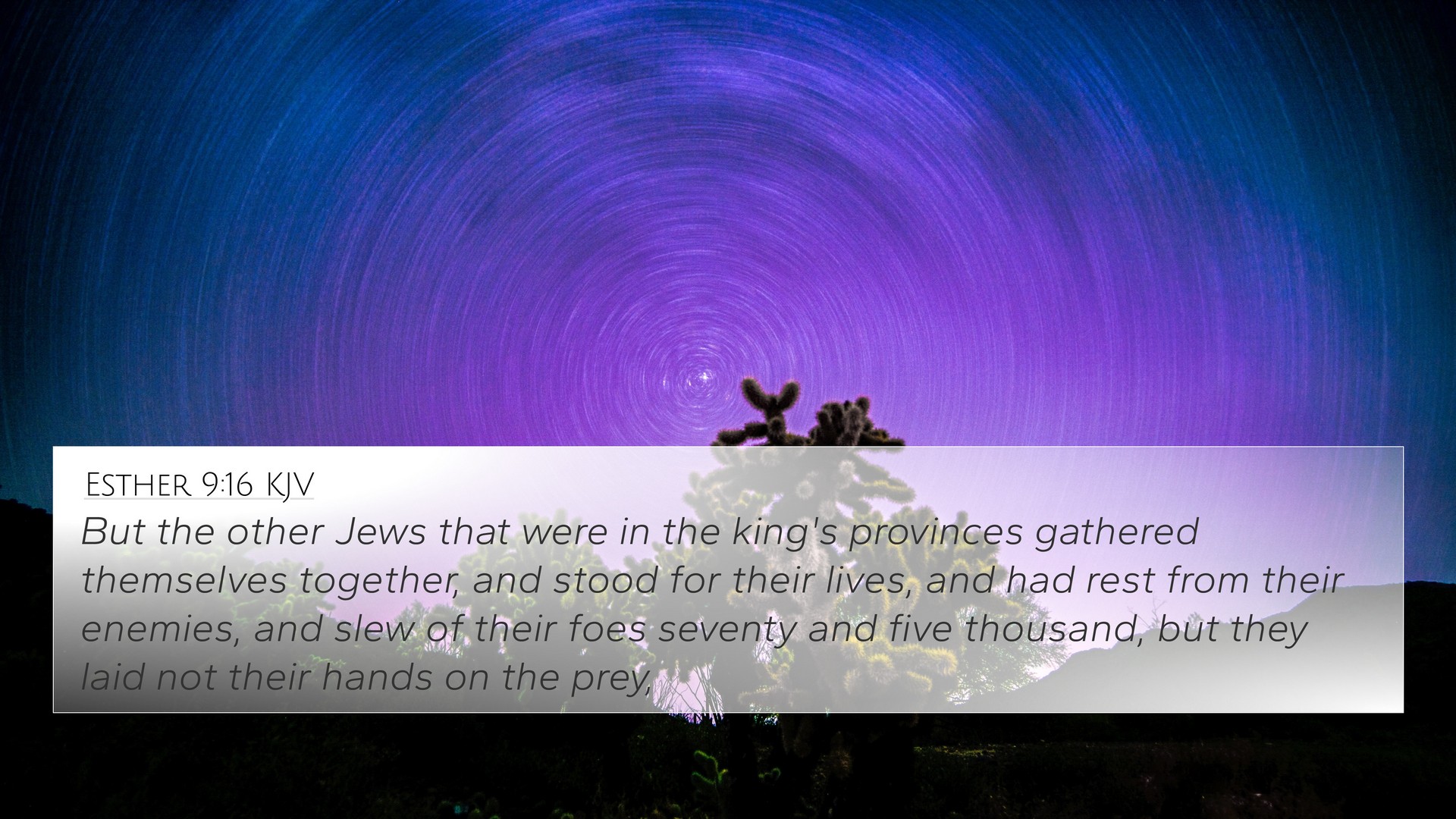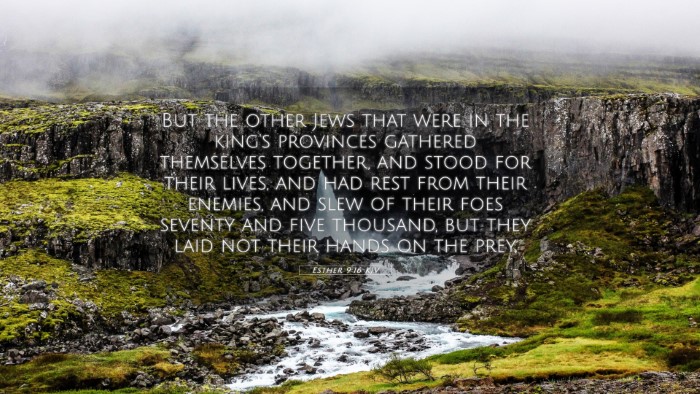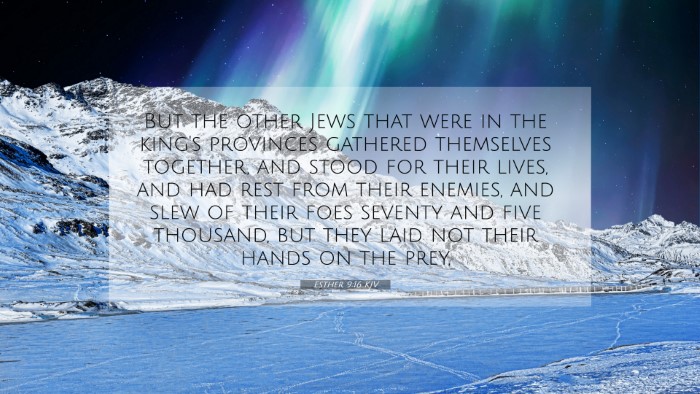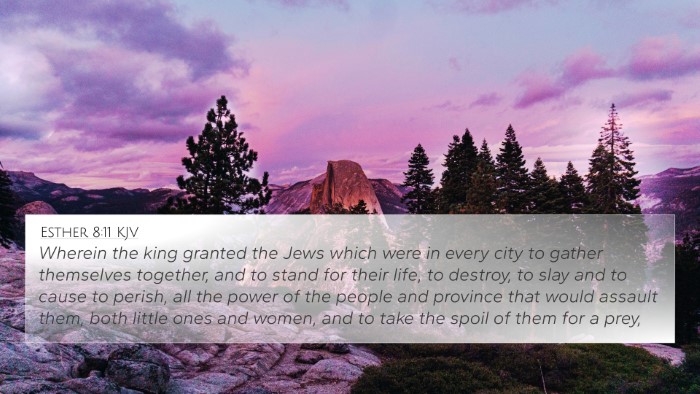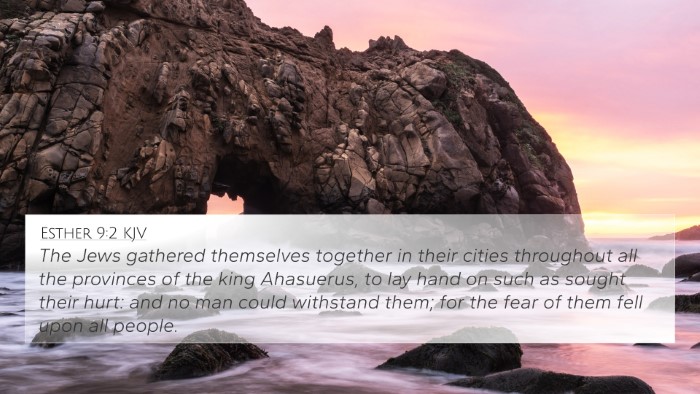Bible Verse Meaning and Interpretation of Esther 9:16
Verse: Esther 9:16 - "The rest of the Jews who were in the king's provinces also gathered to defend their lives, and had relief from their enemies, and killed seventy-five thousand of those who hated them; but they did not lay a hand on the plunder."
Summary of Interpretation
This verse highlights the victory and preservation of the Jewish people during a time of great peril. The Jews, having been threatened with extermination, band together to defend themselves against their adversaries. Not only do they survive, but they also defeat a significant number of their enemies while choosing not to take their possessions, highlighting a sense of justice and restraint.
Commentary Insights
Matthew Henry's Commentary
Matthew Henry emphasizes God's provision and protection over His people. He notes that the text doesn’t glorify the violence but aligns with the necessity of self-defense against unjust aggression. The Jews rallied together, demonstrating unity and trust in divine assistance, showing how God can turn the tide against oppressors when His people act in faith.
Albert Barnes' Commentary
Albert Barnes points out that the overwhelming support from the king’s provinces illustrates the widespread animosity the Jews faced. He underscores the moral decision not to plunder, which signifies their commitment to righteousness in victory. His reflections highlight how the Jews were not only defending themselves but restoring their honor and safety under God's guidance.
Adam Clarke's Commentary
Adam Clarke provides a profound look into the historical context, pointing out the possible political implications of the narrative. He also emphasizes the significance of the number killed, suggesting that the Jews' success reflected divine justice triumphing against their enemies. Clarke remarks on the communal effort of the Jews, illustrating the strength of collective faith and determination.
Cross-References
The verse has notable connections within scripture, showing thematic patterns of deliverance, defense, and divine justice:
- Exodus 17:8-13 - The battle against Amalek, depicting God's support for His people.
- 2 Chronicles 20:15-17 - Asserting that the battle belongs to the Lord, leading to victory through faith.
- Psalm 124:1-8 - A song of ascents acknowledging divine rescue from overwhelming odds.
- Psalm 144:1-2 - A declaration of praise for God as a deliverer in times of trouble.
- Isaiah 54:17 - Promising that no weapon formed against God’s people shall prosper.
- Jeremiah 20:11 - Affirming that the Lord is with the righteous like a mighty warrior.
- Romans 8:31 - Encouraging believers with the assurance that if God is for us, who can be against us?
Thematic Connections
Esther 9:16 serves as a significant point in understanding thematic connections within the Bible. Some of the themes include:
- Divine Protection: The continual theme of God safeguarding His people amidst trials.
- Justice and Righteousness: The moral obligation to uphold justice, even in the face of survival.
- Collective Faith: Unifying together for protection aligns with many passages advocating for communal strength.
Conclusion
The victory in Esther 9:16 illustrates profound spiritual lessons relevant to believers regarding faith, community, and divine intervention. By studying this verse along with its biblical cross-references, one can gain deeper insights into the nature of God’s protection and the ethical implications of conflict.
Tools for Bible Study
For those looking to dive deeper into the meaning of Esther 9:16 and its connections, consider utilizing:
- Bible concordances for identifying related verses.
- Bible cross-reference guides for thematic studies.
- Comprehensive Bible reference resources that highlight inter-biblical dialogue.
- Cross-reference Bible study methods that facilitate understanding relationships between verses.
Final Thoughts
Understanding Esther 9:16 can lead to discovering the ongoing dialogue between scripture passages that highlight God’s intervention, justice, and the communal strength of faith. This verse serves as a reminder of how historical narratives in the Bible carry forward significant spiritual truths applicable to believers today.
